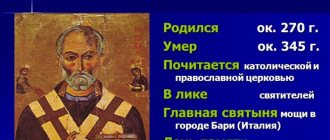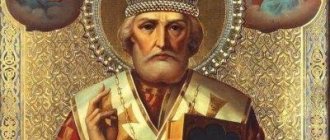Nicholas's parents were Christians, and from his youth he studied the Holy Scriptures. Subsequently, his uncle, the Bishop of Patara, elevated his nephew to the rank of priest.
At the end of the 3rd century, Nicholas made a pilgrimage to Egyptian Alexandria, then to Palestine. It is believed that during one of his trips to Egypt he performed a miracle: he resurrected a sailor who had fallen from the mast. According to other legends, he saved the ship from sinking with prayer.
Around 300 he became bishop of the city of Myra (Lycia, now Demra, Antalya province, Turkey). During the reign of Emperor Diocletian (284-305), who persecuted Christians, Nicholas was imprisoned and later released. According to some of the lives, he participated in the First Ecumenical Council in Nicaea (325), during which he “hit on the cheek” Arius, the founder of the Arian heresy. For this he was condemned at the council, but escaped punishment. As a bishop, he became famous for his charity, intercession for those sentenced to death, etc.
He died, presumably, in 345-351. in the city of Mira. In the Orthodox Church, the saint’s memory is celebrated on December 19 (6 according to the Julian calendar) and May 22 (9).
What about ROCOR?
Russian Church in the name of St. Nicholas the Wonderworker, Bari, Italy
As for the aforementioned traditional attitude of the ROCOR to these problems, it, unfortunately, has become as fragmented as the ROCOR itself today. The Patriarchal ROCOR MP is loyally silent and does not even protest against the Patriarchate’s illegal seizure of ROCOR property in this very Bari (see about this at the end of the article “St. Nicholas the Wonderworker”).
And criticism from some “fragments” goes as far as declaring the Russian people “initiating the coming of the Antichrist.”
Never before in the history of the Church has there been such a depressing state as the one foreseen by St. Seraphim of Sarov: “the bishops will become so wicked that they will surpass the Greek bishops in their wickedness during the time of Theodosius the Younger, so that they will no longer believe in the most important dogma of the faith of Christ”; and about which St. Theophan the Recluse warned: “the name of the Christian will be heard everywhere, and churches and church ranks will be visible everywhere, but all this is only an appearance, inside the apostasy is true.” The time about which the Lord Jesus Christ Himself predicted: “When the Son of Man comes, he will find faith on earth” (Luke 18:8)…
Father Hierarch Nicholas, pray to Christ God to save our souls.
M.V. Nazarov June 5, 2017
Permanent page address:
Leave your comment
« Previous entry
4. Russian Orthodox Church in Bari
The Russian Church in Bari, or the Compound of the Russian Orthodox Church with the Church of St. Nicholas, is located in the alleys of the modern and chaotic outskirts of the city, in the Carassi district on Avenue. Benedetto Croce (corso Benedetto Croce, 12).
It was built specifically for Orthodox pilgrims. The first stone of the temple was laid in 1913 by Russian Tsar Nicholas II on the anniversary of the transportation of the relics of St. Nicholas to Bari. During the 20th century, the temple became the property of various organizations several times and only in 2012 was it officially transferred to Russia.
Please note that Orthodox services are held in the crypt of the Basilica of St. Nicholas on Tuesdays and Thursdays at 10.30.
Did you like the article? We will be grateful for the repost!









